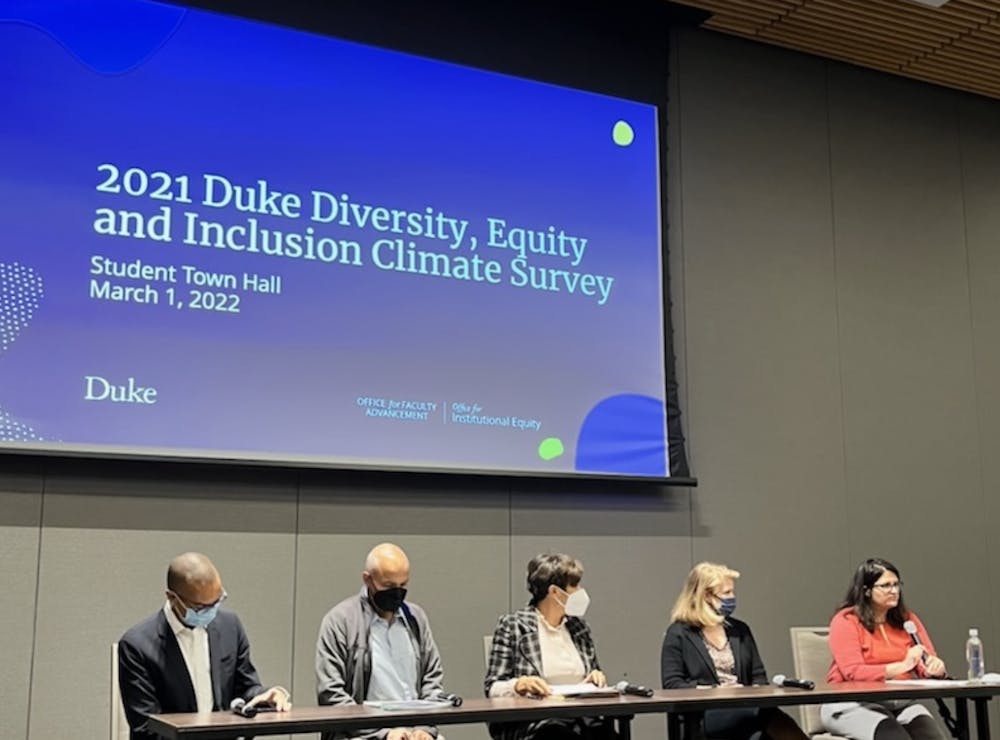Administrators held a student town hall meeting Tuesday evening to discuss the results of their 2021 Diversity, Equity and Inclusion Climate Survey.
The survey was conducted in April 2021 and collected nearly 12,800 responses from students, faculty and staff, according to a Tuesday email sent to undergraduate students from Mary Pat McMahon, vice provost of student affairs, and Gary Bennett, vice provost of undergraduate education. The results of the survey are available on Duke’s anti-racism website.
The survey was designed to help administrators “develop an understanding of the current state of the campus climate and to identify areas of concern and priorities as [they] move forward in [their] racial equity work," according to the website.
The panelists at the town hall were administrators Kimberly Hewitt, vice president for institutional equity and chief diversity officer; Abbas Benmamoun, vice provost for faculty advancement; Shruti Desai, associate vice president of student affairs for campus life; McMahon and Bennett.
McMahon opened the presentation by explaining the goal of the survey.
“A real privilege and value for us is working with students who come to this place and say, ‘I want to see myself in this campus,’” she said. “My job is to build teams and partnerships with students to anticipate who's coming to campus and how we make sure that campus is inclusive.”
Bennett said that Duke, when it was built, “was not ready for the diversity that it now enjoys.” He added that the best universities are capable of continual adaptation to meet evolving student needs.
Before sharing survey highlights, Hewitt noted that the data is limited by its reliance on a gender binary and the limited number of racial categories reported. She also noted that the survey response rate was much lower among students than faculty and staff, and that Duke is looking for ways to incentivize participation in the future.
The first section of the survey involved questions about respondents’ satisfaction with diversity in leadership, faculty, advancement opportunities and the overall climate for underrepresented minority groups. Across each of these categories, Black respondents, LGBTQ+ respondents and women-identifying respondents consistently reported lower levels of satisfaction.
“The dynamic across these marginalized communities is similar in all of these questions,” Hewitt noted.
The next section, presented by Benmamoun, involved questions assessing respondents' comfort expressing their views, access to information about advancement and perception of fair compensation. The survey reflected similar racial disparities in these categories as well.
“I am a firm believer in excellence through diversity. You can be an excellent institution because you are bringing different voices, different experiences, going to vibrant research labs, vibrant classrooms, because you have multiple points of view and multiple experiences,” Benmamoun said. “So it is good for the academic bottom line for access for academic excellence.”
Benmamoun also discussed perceptions of microaggressions, which were greater among women-identifying and Black members of the Duke community. He noted that the numbers at Duke were consistent with survey results from Stanford University.
Duke’s survey found that of Black survey respondents, 9.7% of students reported experiencing microaggressions very often, 17.9% often, 35.3% sometimes and 18.8% seldom, resulting in a total of 81.9%. According to the Stanford survey, 66% of Black or African-American undergraduate respondents experienced at least one form of microaggression. Of students who identified with racial or ethnic identities other than or in addition to white or European, 44% to 61% experienced microaggressions.
As for areas of improvement, most survey respondents asked for better recruitment and hiring practices, as well as opportunities to interact across groups.
“Your success is dependent on the success of others. It’s important to promote access to a sense of community and interdependence,” Benmamoun said.
Benmamoun then turned to what Duke is doing to improve diversity and equity among faculty, highlighting faculty development workshops and seed grants for researchers to pilot ideas related to racial justice.
At the end of the presentation, the panel gave the floor to the audience for questions.
A student in the audience asked about how Duke can facilitate conversations between Black students and faculty in more formal ways. She noted that these groups share many of the same experiences, but they don’t have a common space available.
Dawna Jones, director of the Mary Lou Williams Center for Black Culture, said that they have started a program to hold events bringing faculty, staff, students and alumni to have these conversations. She highlighted a recent event involving microaggressions and presenting authentically in the workplace.
Get The Chronicle straight to your inbox
Sign up for our weekly newsletter. Cancel at any time.
Another student expressed that students often had unsatisfying experiences with resources at Duke.
“The Women’s Center wasn't getting back for a week on certain issues, and [Counseling & Psychological Services] weren’t getting back for a month on certain issues,” the student said.
McMahon responded, highlighting staffing issues they’re having across these organizations, but acknowledging the validity of this problem.
“We really need to invest in both areas, right? So both in the need for intervention in a moment when you need support and then a sort of broader climate effort at Duke to prevent those things from happening,” she said.
Anisha Reddy is a Trinity junior and a senior editor of The Chronicle's 118th volume.

